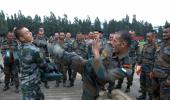Will China's new military reforms endanger Xi Jinping's rule, asks Claude Arpi.
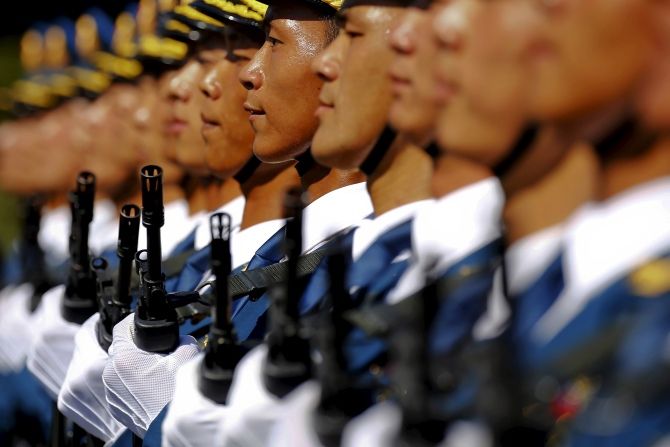
China has undertaken mega military reforms leaving no doubt that it is arming itself.
On December 28, the PLA Daily announced that the People's Liberation Army Navy had just commissioned three new vessels, including a Dongdiao-class auxiliary general intelligence ship named Neptune, to bolster China's intelligence gathering and surveillance capabilities in the disputed South China Sea.
Three days later, Senior Colonel Yang Yujun, spokesman for the ministry of national defence stated: 'Taking various factors into consideration, relevant authority started the research and development of China's second aircraft carrier, which is currently under independent design and construction.'
It will be propelled by a conventional power plant and have a displacement of 50,000 tons; in many ways, it will be similar to the Liaoning, the first Chinese carrier.
The same day (the last day of 2015), President Xi Jinping, who is also Chairman of the Central Military Commission, inaugurated three new PLA 'units' or 'services', namely, the PLA Land Army, the PLA Rocket Force and the PLA Strategic Support Force.
Xi said it was 'an important decision to realise the Chinese Dream and the Dream of a Strong Military, and a strategic initiative to build a modern military power system with Chinese characteristics.'
According to the Chinese president it should 'optimise its power structure and troop formation, speed up the army's transformation and build a powerful, modern and new-type army.'
Regarding the PLA Land Army, The South China Morning Post commented: 'Once the changes are in place the CMC will take direct charge of administering all military wings, including the PLA, the People's Armed Police, and the militia and reserve forces.'
The PLA Rocket Force will take over from the Second Artillery Force to 'strengthen the trustworthy and reliable nuclear deterrence and nuclear counter-attack capabilities, intensify the construction of medium and long range precision strike power.'
Yang Yujun had earlier asserted that the creation of the Rocket Force was consistent with China's nuclear policy and strategy.
The PLA Strategic Support Force, an 'important growth point' of China's combat capabilities will deal with hi-tech warfare in space and cyberwar.
The seven Military Area Commands are being replaced by five Combat Zone Commands.
Finally on January 11, Xi announced the reorganization of the four PLA military departments -- staff, political, logistics and armaments -- into 15 new units which will directly work under the CMC.
When he met the bosses of the new unit, Xi described the reshuffle as a 'breakthrough' and a 'crucial step' toward a stronger military.
Xi further urged the new leaders to 'frequently, actively and resolutely' align their direction with the CPC Central Committee and the CMC.
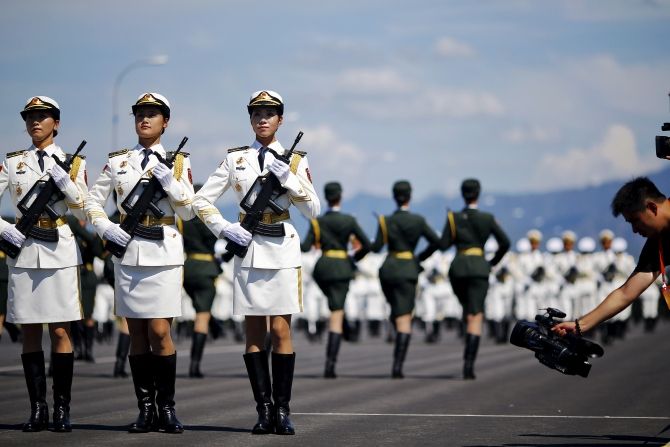
Already on November 7, The People's Daily published a commentary calling on military authorities to win the 'battle of military reforms.'
The Communist Party mouthpiece reiterated the party's absolute leadership over the military and asked the armed forces to 'remain consistent with the central authorities' decisions.'
Probably some elements in the PLA are today not 'consistent' with the party.
The The People's Daily warned: 'Senior leading departments and officials should play a guiding role in the process. They must back the central authorities' decisions and oppose political liberalism. They must not act on their own, gossip or make irresponsible remarks.'
The entire PLA reorganisation could prove a perilous exercise.
The South China Morning Post, always well informed as far as defence matters are concerned, commented: 'The restructure is part of Xi's massive military overhaul, which aims to shift the PLA from an army-centric system towards a Western-style joint command, in which the army, navy and air force are equally represented.'
Last month, in a long speech carried by Xinhua, Xi gave a rather detailed report on the planned reforms. 'Under the leadership of the Communist Party,' he asserted, 'our military has gone from small to big, from weak to strong, from victory to victory. On this road, reform and innovation steps have never stopped.'
Under the new dispensation, two deputy commanders of the PLA general staff department, Admiral Sun Jianguo, 63 (who recently visited India with the CMC vice-chairman) and Lieutenant General Yi Xiaoguang, 57, should respectively take over the PLA Navy and Air Force, while General Li Zuocheng, 62, commander of the Chengdu MAC, is to become the first chief of a newly-formed land force command.
Three new chiefs should automatically become members of the CMC.
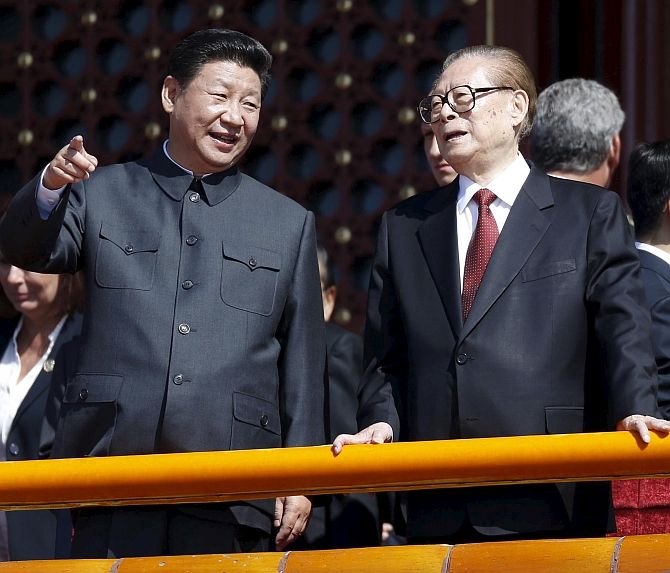
What is the objective of this exercise apart from cutting the corruption rampant in each department?
The declared purpose of the exercise is to have, by 2020, a military setup 'capable of winning information-age warfare.'
'Efficiency' is clearly the new mantra.
'The troop cuts are part of long-mooted reforms to simplify and further professionalise the military, especially command and leadership structures that are still largely run along Soviet lines,' Reuters noted.
It is obvious that if China wants to pick a fight with the US or Japan or even with its smaller neighbours, its armed forces need to be ready. Today, they are not.
By focusing on merging similar functions, the multiple-department CMC should become more efficient to supervise and coordinate the defence forces.
Even the intelligence set-up will be transformed.
'The wide-ranging scope of the new PLA reforms will have many unforeseen second- and third-order consequences (for Chinese intelligence),' Peter Mattis, a Fellow in the China Programme at The Jamestown Foundation, noted.
'If the Chinese military implements every single one of the announced proposals,' he added, 'this round of reform could wind up being as significant as the reforms undertaken in the early 1950s.'
,font size=7>A new personnel ratio between the Army, Navy, Air Force, Rocket Force and Strategic Support Force should take care of the 'increasingly complicated global situation faced by the world's largest rising power,' wrote The Global Times.
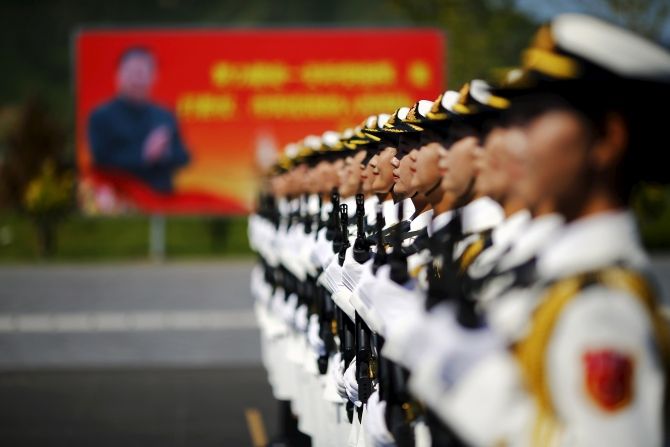
As a large number of staff will be out of jobs, particularly in the political department, how to temper the resentment of the generals and troops?
The PLA Daily recently called for those who will lose their positions to 'jump out of the box of self-interest... those with ulterior motives, officers and soldiers must maintain their ideological and political convictions.'
The PLA Daily acknowledges that it will require that the high-level authorities and senior cadres provide the example. Will the 'retired' generals do this?
One sign that all is not well for Xi is the visit of the entire China Military Commission to The PLA Daily in December. Xi called on the journalists to play a leading role in strengthening the military and to innovate.
The newspaper, Xi said, should uphold party principles and 'unswervingly' embrace the Communist Party leadership.
Xi also asked the publication to explain the military reform to the officers and soldiers and 'guide' the officers and soldiers to support and take part in the reform.
Another sign of the difficult times ahead is the fact that Xi did not manage to promote one of his proteges, General Liu Yuan, who retired as the political commissar of the PLA's logistics department.
Liu, former Chinese president Liu Shaoqi's son, greatly helped Xi in his campaign to cleanse the 'flies and tigers' in the PLA ranks. With two CMC vice-chairmen being investigated, Liu was expected to be appointed secretary of a Central Commission for Discipline Inspection to be set up within the CMC.
The fact that he did not get the job tends to show that Xi does not have full control.
What do these reforms mean for India?
On December 31, Senior Colonel Yang Yujun, the spokesman for the ministry of national defence, commented on the situation on the China-India border, sating, 'The two militaries have strengthened border defence contacts through institutionalised channels in the border area... The Chinese side is ready to work with the Indian side to jointly maintain peace and stability in the border region.'
In the coming year, China will try to keep the situation on the border stable, but in longer terms, the Chinese defence forces will become fitter, better prepared and far better coordinated.
Militarily, reforms make sense for China. It also implies that India has a few years to prepare itself, with the new Mountain Strike Corps for example.
Will the Indian leadership take up the opportunity is another question.
